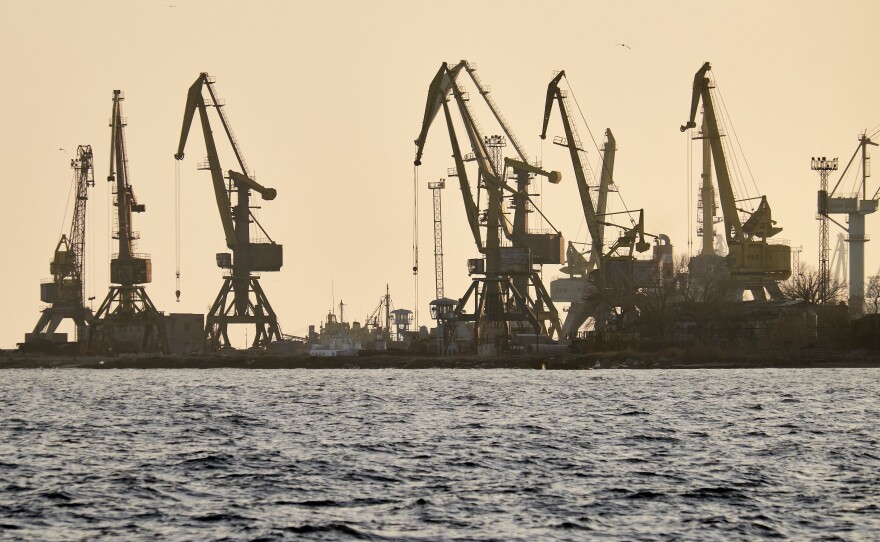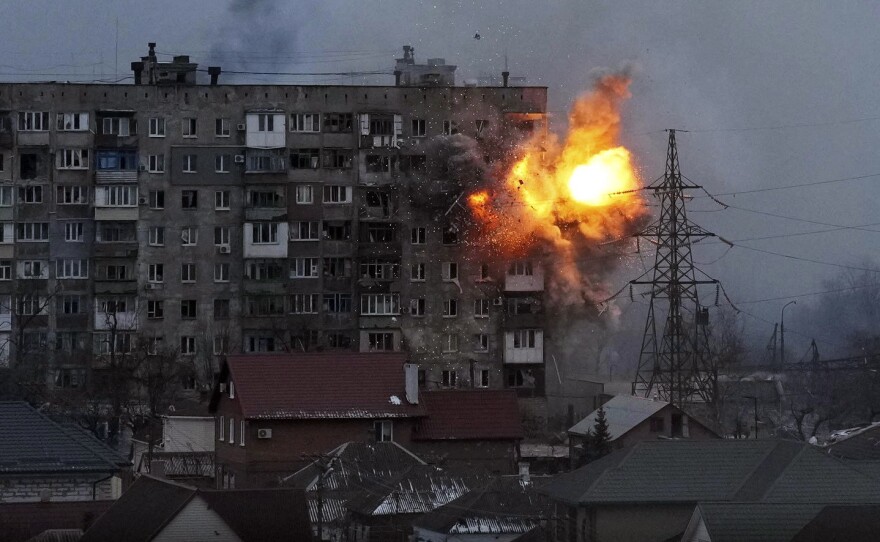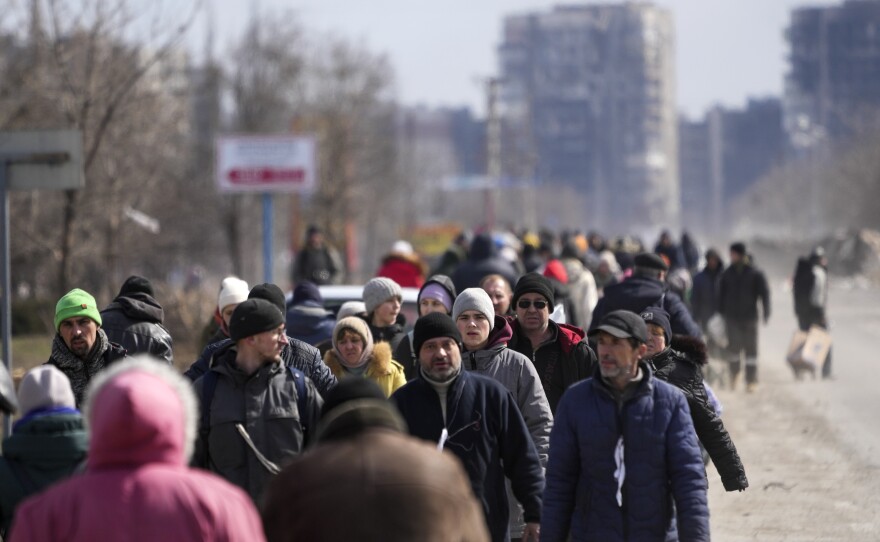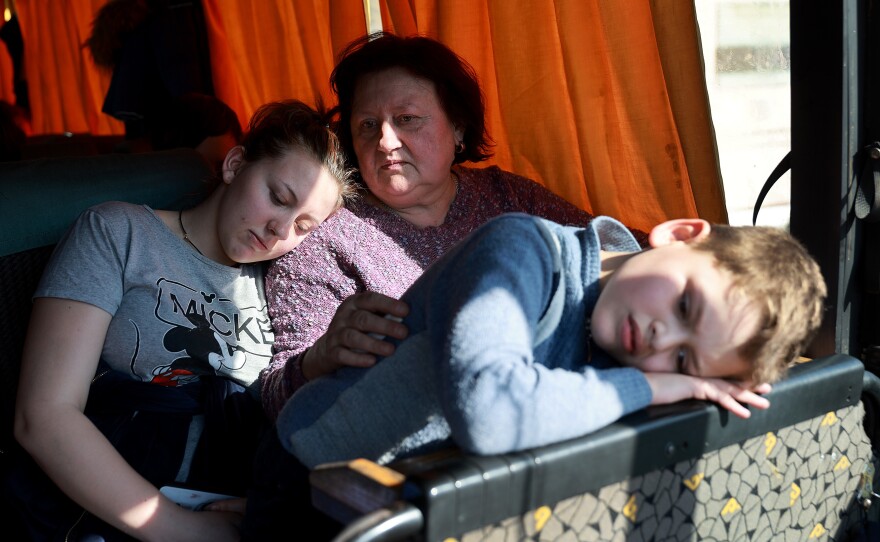Updated April 18, 2022 at 2:53 PM ET
After being battered for nearly two months by Russian airstrikes, the southeast Ukraine city of Mariupol is at risk of falling to Russian forces. If Mariupol does fall, it will be the biggest military win for Russia since it began its invasion of Ukraine on February 24.
A group of Ukrainian fighters holed up in the Azovstal steel plant in Mariupol were told by Russian troops to lay down their arms and surrender. But Ukraine's prime minister says his country will "fight to the end."
Meanwhile, as many 100,000 civilians are trapped in the besieged city with no way out. Ukraine and Russia haven't been able to agree on the conditions to create a humanitarian corridor out of the city in recent days. Ukrainian officials are calling for safe passages to be established, for civilians as well as wounded Ukrainian soldiers.
Why is this city so important? There are several reasons — for the Russian military and for the people of Ukraine.
For Russia, Mariupol is a major port city in a key location
1. The city is in a strategic place militarily.
Mariupol is located between Crimea, which Russia annexed from Ukraine in 2014, and the region of Eastern Ukraine called Donbas, much of which was already controlled by Russian-backed separatists.
Russian President Vladimir Putin recognized the "independence" of two enclaves there prior to the full-scale invasion of Ukraine. Those are the two areas — so-called Donetsk and Luhansk people's republics — that have faced Russian aggression since 2014.
"Mariupol is right in between them. So taking Mariupol is part of the campaign in the south and the southeast to connect the Russian-held areas, essentially," Rita Konaev, an expert on the Russian military at Georgetown University, told NPR in March.
By controlling Mariupol, Russia could potentially create a land bridge to Crimea and control the entire north shore of the Sea of Azov.
Russia hopes to hem in Ukrainian forces in the east and southeast of the country, a senior U.S. defense official said in a call with reporters last month.
Loading...
2. As a port city, Mariupol is important economically.
Mariupol has long been an important industrial port city. In peacetime, it is a major site for exporting Ukrainian steel and grain.
That status has already been altered by war, Liam Collins, a retired colonel with U.S. Army Special Forces who has trained Ukrainian forces, told NPR in March. With Mariupol under siege, it's not able to currently produce for the war effort, he said.
The major impact would come if a negotiated settlement partitions off part of Ukraine, said Collins: "Ukraine's not going to want to do that after 2014 and 2015 [when Russia essentially took part of Eastern Ukraine], but it's always a possibility."
If Russia effectively cuts off Mariupol for the long term, and with it access to the Sea of Azov, it will damage Ukraine's finances and economic sustainability, hindering the country's ability to sell and ship its products.
"It's part of a broader effort to effectively cut Ukraine off from access to the sea, which is a really important part of Ukrainian economy and trade," Konaev said.

3. Taking Mariupol would be a boon to Russian morale.
If Russia succeeds in controlling Mariupol, it would be a major morale boost for Russia.
In recent weeks Russia has been pushed back from Kyiv and the Moskva, the flagship of its Black Sea fleet, has sunk.
After encountering significant military challenges, Russian troops have focused on gaining control of a larger area in eastern Ukraine.
Collins said capturing Mariupol would be notable for Russia — it not only "shows that you're having success, but it shows that you control a larger city."
There's also the possibility that Russian President Vladimir Putin could capitalize on taking Mariupol with specific propaganda. The Azov Regiment, a unit with neo-Nazi origins that has been folded into Ukraine's National Guard, is present in Mariupol. Because Putin has repeatedly and incorrectly framed his invasion of Ukraine as a denazification effort, winning Mariupol could provide new fodder for his false narrative.
4. If negotiations happen, new boundaries could be drawn.
Peace negotiations between Russia and Ukraine have been fruitless so far. But at some point down the road, there could be talks in which new boundary lines are drawn.
Which areas are held by Russian forces could shape where a theoretical new line could be drawn. And if Mariupol falls to Russia, new lines could mean that it ends up as part of a Donbas that is controlled by Russia or as an independent republic, recognized by Russia.
But this isn't a war that Russia will win by conquering a certain amount of territory, Collins said. "There are no winners in this. It's war. Both nations are going to lose regardless of the outcome. It's just a matter of which one loses more."

For Ukraine, Mariupol has been inspiring — and losing it could make the war effort harder.
1. The Ukrainian army's resistance there has been a fuel for the Ukrainian people.
The Russian bombs have been terrifying and brutal for the people of Mariupol. And the grit that the city's residents have shown has been a source of inspiration to other Ukrainians. "Right now Mariupol is this legendary stronghold of resistance," said Konaev last month, "and I think it's fueling resistance everywhere else."
If Ukraine's military is able to somehow hold on to Mariupol, it could set the tone for the rest of the country.
"That would just really amplify that David and Goliath story and could feel like a turning point," she said. While that might not be the decisive factor in a protracted campaign, she said it could be important in shaping the narrative around the war.
Konaev said in an email to NPR on Monday that losing Mariupol would be a difficult blow for the Ukrainians, "especially given the immense humanitarian costs and the brutality of Russian attacks on the city."
Still, she added, "the very fact that resistance in Mariupol has held this long, fought this heroically, and has defied all odds is a victory within itself, and will continue to fuel the Ukrainian war effort as they defend the rest of their country."

2. The humanitarian disaster could get worse if Russia takes the city.
Losing Mariupol to Russia would likely add further misery and devastation for the city's residents.
Before the war, Mariupol was a city of 450,000 people. Now about 100,000 remain there, without food, water, electricity or heat, the Associated Press reports. Ukrainian officials say at least 21,000 people have been killed in bombardments or street fighting.
Ukrainian vice prime minister Iryna Vereshchuk said on Telegram that Russia had continued to block and shell humanitarian routes, so there would be no humanitarian corridors out of Mariupol on Monday.
She said some people had been able to escape Mariupol "by their own transport" and that humanitarian corridors had been established in other cities.
3. It's not clear what Russia "owning" Mariupol would look like.
What would it look like for Russian troops to control Mariupol? It's likely, said Collins, that low-grade fighting would continue for a long time.
"Even if Russia gets to the point of so-called 'owning' it," said Collins, "they most likely will come under significant attack from the various volunteers that are in the city."
But Konaev doesn't think Russia plans to physically occupy Mariupol and other cities to achieve its aims — "but more likely to render them unlivable, transfer power to local actors (insofar as they can find such willing parties), and push for a ceasefire that solidifies their control over what is left of the region."
"Whether the Ukrainians will be willing to accept such terms is another question," she said.
Copyright 2022 NPR. To see more, visit https://www.npr.org. 9(MDAzMjM2NDYzMDEyMzc1Njk5NjAxNzY3OQ001))








